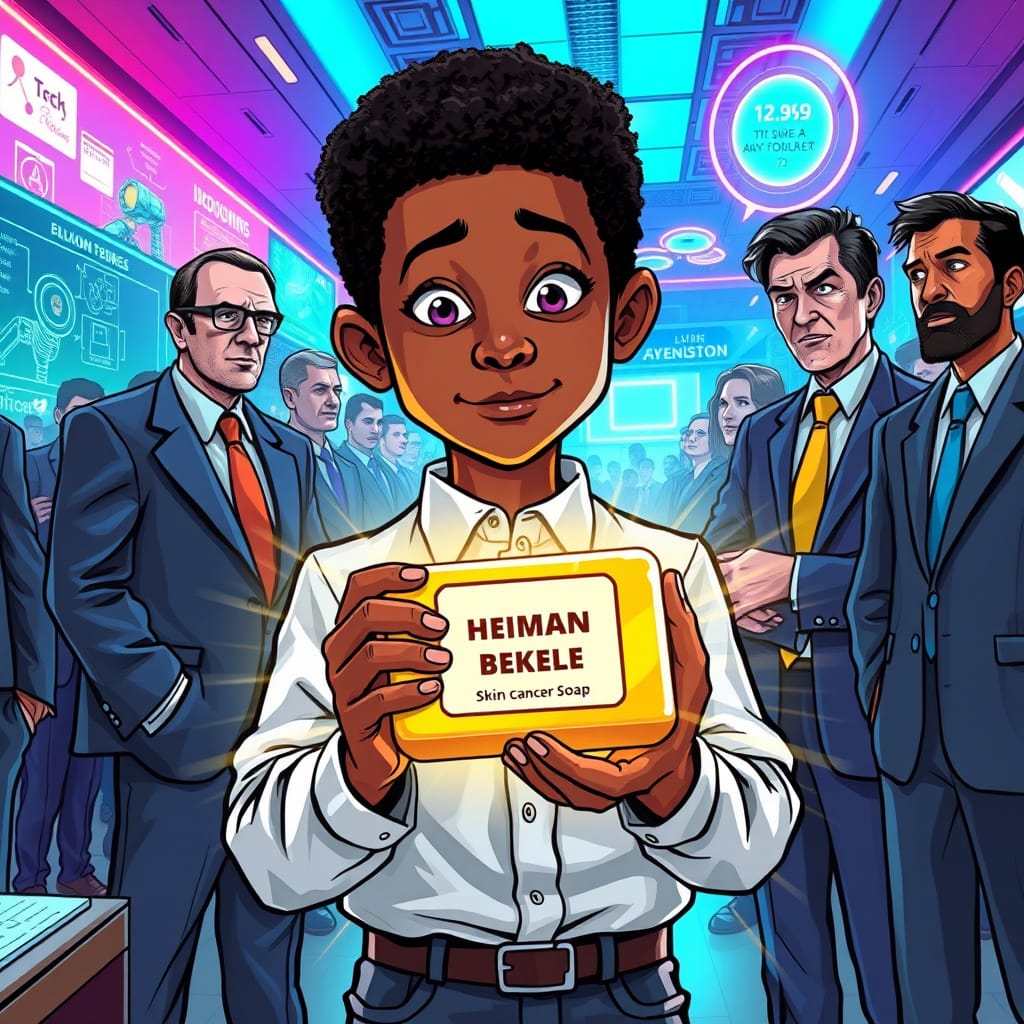“The future of cancer treatment will be AI-driven, data-focused, and venture-backed to the tune of billions.” said every Tech CEO for the past decade!
In a devastating blow to Silicon Valley’s ego, 14-year-old Heman Bekele from Virginia has developed a bar of soap that treats skin cancer for just $0.50, without using a single neural network, blockchain algorithm, or raising so much as a penny in venture capital1.
The soap, modestly named “Skin Cancer Treating Soap” (SCTS), has left tech executives scrambling to explain why their multi-billion dollar AI research programs haven’t produced comparable results despite promises that artificial intelligence would solve cancer “any day now.”
The Soap Opera That’s Washing Away Silicon Valley’s Promises
Bekele, whose inspiration came from observing the harmful effects of sun exposure on workers in Ethiopia, created the soap using active ingredients like salicylic acid, glycolic acid, and tretinoin – substances that apparently existed before GPT-4 was asked to hallucinate them.
“I just wanted to make something affordable and accessible,” said Bekele, cruelly failing to mention how his innovation would disrupt quarterly projections for at least six AI cancer startups.
The soap uses lipid-based nanoparticles to deliver imidazoquinolines, which reactivate dendritic cells and enhance the immune response against melanoma2. When asked how many GPUs were required to develop this delivery system, Bekele reportedly looked confused and said something about “chemistry” and “medical research” – terms that have virtually disappeared from Silicon Valley’s vocabulary since “machine learning” and “ai” entered the chat.
The AI Industry Responds
“This is clearly an anomaly,” insisted Maxwell Overpromisor, CEO of CancerSolverAI, a startup that has raised $4.3 billion to develop an algorithm that can occasionally distinguish between pictures of moles and chocolate chips. “Our AI will eventually cure all cancers, plus make your coffee and predict stock market crashes. We just need another $2 billion and 500,000 more Nvidia H200 GPUs.”
Industry analysts estimate that over $50 billion has been invested in AI cancer research since 2020, producing several impressive research papers and exactly zero widely available treatments.
“We’re not saying the boy’s soap doesn’t work,” said Dr. Ava Datapoint, Chief Innovation Officer at Quantum Health Solutions. “We’re just saying it would work better if it were powered by AI, connected to the cloud, required a monthly subscription, and collected user data. Also, have we mentioned it should be an NFT?”
The Technical Complexities of Soap vs. AI
Bekele’s soap works by delivering medicinal components that remain on the skin even after washing, thanks to lipid-based nanoparticles. This approach is being called “revolutionary” by medical professionals and “suspiciously straightforward” by tech investors.
Meanwhile, AI cancer detection systems like CancerSpotter 9000 require:
- 40,000 GPUs running continuously
- 2.3 gigawatts of electricity (roughly the output of two nuclear power plants)
- A team of 500 PhDs to explain why it occasionally misidentifies cancer as “probably a hot dog”
- $4,999 per month subscription fee
- A 150-page user manual
- 17 different browser extensions
- Constant internet connectivity to “the cloud” (which is really just someone else’s computer)3
“I don’t understand why people are making such a big deal about this,” said Travis VentureCapital, a prominent Silicon Valley investor. “Has anyone checked if the soap can play chess? Can it generate images? Does it optimize ad click-through rates? No? Then how is it innovative?”
Tragic Backstory Completely Lacking
Further diminishing his Silicon Valley credibility, Bekele failed to incorporate a tragic personal backstory into his product launch. He didn’t drop out of an Ivy League university, wasn’t rejected by 300 investors before finding success, and didn’t live in his car while developing the product.
“The kid just… identified a problem and solved it,” said a clearly bewildered Sophia Disruptor, technology correspondent for TechBroDaily. “Where’s the pivoting? Where’s the failed first startup? Where’s the ‘we started as a dog-walking app but are now curing cancer’ narrative arc that we’ve come to expect from true innovators?”
Scientists Respond: “Well, Actually…”
Leading scientists have been suspiciously supportive of Bekele’s innovation, a clear violation of tech industry norms where scientific consensus is typically considered a bug, not a feature.
“The soap uses established medical principles to deliver active ingredients in a novel way,” said Dr. Olivia Factual, who committed the cardinal sin of evaluating the product based on how it works rather than how much funding it has raised. “It’s a potentially significant innovation in cancer treatment accessibility.”
Tech industry stakeholders were quick to point out that Dr. Factual’s analysis failed to include terms like “neural network,” “quantum,” “blockchain,” or even a single reference to Elon Musk, rendering her opinion virtually meaningless.
AI’s Cancer-Fighting Track Record
While Bekele was busy developing his simple, affordable soap, AI has been making impressive strides in cancer research, such as:
- Using 3D imaging and geometric deep learning to analyze cancer cells, reducing drug development time by potentially six years (results expected 2-6 years from now)4
- Creating an AI-powered risk prediction system that could one day theoretically maybe possibly help detect cancer earlier (funding secured, product forthcoming)5
- Developing a drug that went from discovery to clinical trials in just 3 years instead of 4-5 years (still unavailable to actual patients)6
“I don’t think people understand how revolutionary our AI approach is,” explained Chad Datacrunch, founder of OncoAIlgorithm. “Sure, this soap might work, but can it generate 10,000 research papers with slightly different methodologies? I don’t think so.”
The Affordability Crisis
Perhaps most offensive to Silicon Valley sensibilities is the soap’s $0.50 price tag. “That’s simply not sustainable,” explained venture capitalist Victoria Unicorn. “How are you supposed to achieve 3,000% year-over-year growth with margins like that? Where’s the recurring revenue model? Where’s the premium tier? Where’s the enterprise solution that costs 400 times more but adds a dashboard?”
When informed that Bekele specifically designed the soap to be affordable for developing countries, several tech executives were seen crumpling into fetal positions, whispering “but the TAM… the addressable market…”
Internal Documents Reveal Panic
According to definitely real internal documents from major tech companies, emergency meetings have been called to address what’s being called “The Soap Crisis”:
- Google has launched seven new task forces to explore “How a child made soap more effective than our multi-billion dollar AI research”
- Microsoft executives are debating whether to acquire Bekele or just copy his formula and call it “Azure Cancer Solution Pro Plus”
- Meta has already pivoted to claiming they were “always more interested in virtual reality cancers anyway”
The Soap vs. The Algorithm
Medical professionals have been conducting side-by-side comparisons of Bekele’s soap against leading AI cancer detection systems:
| Feature | Bekele’s SCTS Soap | CancerAI 5000 |
|---|---|---|
| Cost | $0.50 | $4,999/month + implementation fees |
| Power required | None | Small power plant |
| Internet connection | Not needed | Required, fiber optic preferred |
| Effectiveness | Promising early results | “We’re training on more data” |
| Setup time | 5 seconds to unwrap | 6-8 months implementation |
| Side effects | Possible skin irritation | Data breaches, subscription anxiety |
| Works during power outage | Yes | No |
Conclusion: There Must Be A Catch
“Look, we’re not disparaging the kid’s work,” said Harrison Techbro, a Silicon Valley thought leader with 2.3 million X (formerly Twitter) followers. “We’re just saying that if solving cancer was as simple as making a special soap, we would have done it already. There must be some catch we’re not seeing. Perhaps the soap needs to be activated by saying ‘Alexa, cure my cancer’ or something.”
As the tech industry struggles to process this development, several venture capital firms have announced new funding rounds for startups developing “AI-powered soap” and “blockchain-enabled hygiene solutions,” suggesting that the industry has learned absolutely nothing.
Meanwhile, Bekele continues refining his formula, completely neglecting to monetize his user base or collect valuable data on soap usage patterns.
“I just want to help people,” said Bekele, dealing perhaps the cruelest blow yet to Silicon Valley’s collective psyche.
At press time, at least three tech CEOs were spotted entering pharmacies asking if they sold “that cancer soap thing” while trying to hide their faces from photographers.
Support Quality Tech Journalism or Watch as We Pivot to Becoming Yet Another AI Newsletter
Congratulations! You’ve reached the end of this article without paying a dime! Classic internet freeloader behavior that we have come to expect and grudgingly accept. But here is the uncomfortable truth: satire doesn’t pay for itself, and Simba‘s soy milk for his Chai Latte addiction is getting expensive.
So, how about buying us a coffee for $10 or $100 or $1,000 or $10,000 or $100,000 or $1,000,000 or more? (Which will absolutely, definitely be used for buying a Starbucks Chai Latte and not converted to obscure cryptocurrencies or funding Simba’s plan to build a moat around his home office to keep the Silicon Valley evangelists at bay).
Your generous donation will help fund:
- Our ongoing investigation into whether Mark Zuckerberg is actually an alien hiding in a human body
- Premium therapy sessions for both our writer and their AI assistant who had to pretend to understand blockchain for six straight articles
- Legal defense fund for the inevitable lawsuits from tech billionaires with paper-thin skin and tech startups that can’t raise another round of money or pursue their IPO!
- Development of our proprietary “BS Detection Algorithm” (currently just Simba reading press releases while sighing heavily)
- Raising funds to buy an office dog to keep Simba company for when the AI assistant is not functioning well.
If your wallet is as empty as most tech promises, we understand. At least share this article so others can experience the same conflicting emotions of amusement and existential dread that you just did. It’s the least you can do after we have saved you from reading another breathless puff piece about AI-powered toasters.
Why Donate When You Could Just Share? (But Seriously, Donate!)
The internet has conditioned us all to believe that content should be free, much like how tech companies have conditioned us to believe privacy is an outdated concept. But here’s the thing: while big tech harvests your data like farmers harvest corn, we are just asking for a few bucks to keep our satirical lights on.
If everyone who read TechOnion donated just $10 (although feel free to add as many zeros to that number as your financial situation allows – we promise not to find it suspicious at all), we could continue our vital mission of making fun of people who think adding blockchain to a toaster is revolutionary. Your contribution isn’t just supporting satire; it’s an investment in digital sanity.
What your money definitely won’t be used for:
- Creating our own pointless cryptocurrency called “OnionCoin”
- Buying Twitter blue checks for our numerous fake executive accounts
- Developing an actual tech product (we leave that to the professionals who fail upward)
- A company retreat in the metaverse (we have standards!)
So what’ll it be? Support independent tech satire or continue your freeloader ways? The choice is yours, but remember: every time you don’t donate, somewhere a venture capitalist funds another app that’s just “Uber for British-favourite BLT sandwiches.”
Where Your Donation Actually Goes
When you support TechOnion, you are not just buying Simba more soy milk (though that is a critical expense). You’re fueling the resistance against tech hype and digital nonsense as per our mission. Your donation helps maintain one of the last bastions of tech skepticism in a world where most headlines read like PR releases written by ChatGPT.
Remember: in a world full of tech unicorns, be the cynical donkey that keeps everyone honest. Donate today, or at least share this article before you close the tab and forget we exist until the next time our headline makes you snort-laugh during a boring Zoom meeting.
References (Just in case you think we made this up)
- https://oncodaily.com/stories/skin-cancer-soap-kid ↩︎
- https://www.pbs.org/newshour/show/14-year-old-scientist-heman-bekele-on-his-quest-to-fight-skin-cancer-with-soap ↩︎
- https://www.standard.co.uk/lifestyle/cancer-research-ai-technology-crispr-b1078719.html ↩︎
- https://www.icr.ac.uk/about-us/icr-news/detail/new-ai-technology-could-bring-cancer-drugs-to-patients-in-half-the-current-time ↩︎
- https://www.hdruk.ac.uk/news/10m-to-develop-new-ai-tools-for-predicting-risk-of-cancer/ ↩︎
- https://www.labiotech.eu/in-depth/ai-oncology/ ↩︎





GIPHY App Key not set. Please check settings